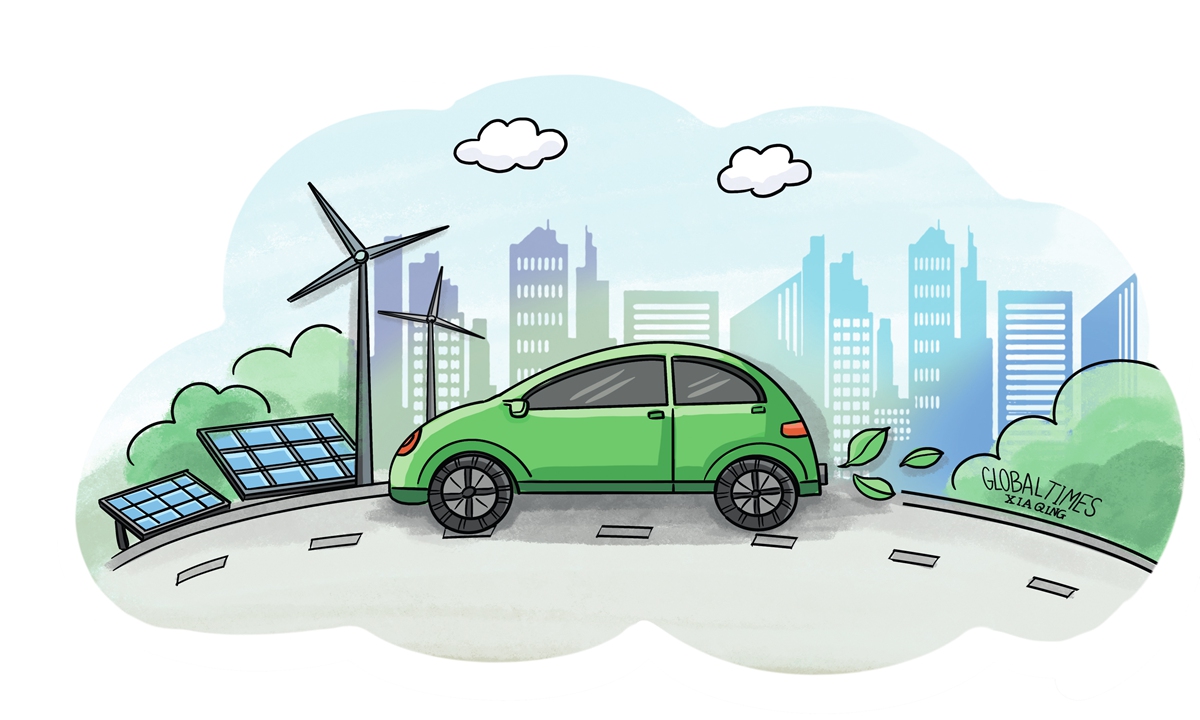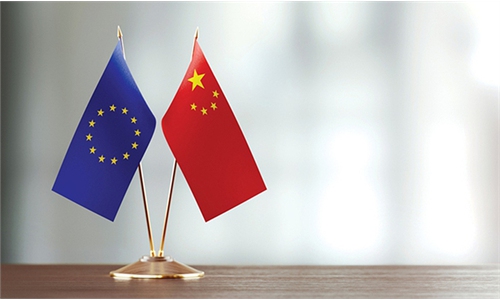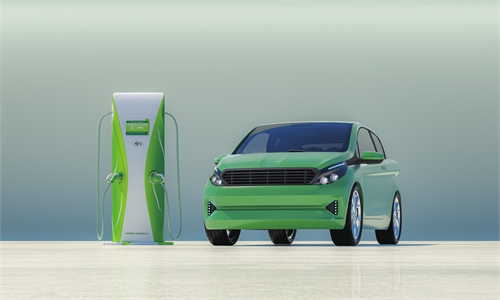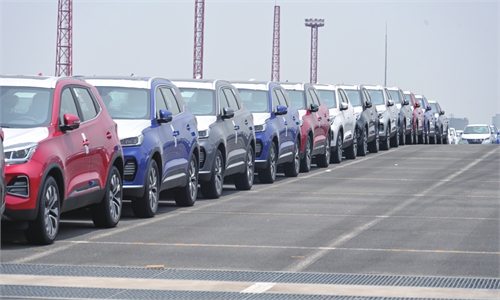
Illustration: Xia Qing/Global Times
Production and sales of new-energy vehicles (NEVs) have soared in China since the beginning of 2022, thanks to the central government's persistent efforts to accelerate high-quality manufacturing and build up the nation's industrial competitiveness in the global marketplace. At the same time, China is committed to green and sustainable development in order to reduce greenhouse gas emissions and lead in the worldwide push to combat climate change.Benefiting from China's huge market size and the government's pro-growth measures, NEV production will continue to flourish and NEV-related new technology innovations will continue to be rolled out in the world's second-largest economy.
China now leads the world in both NEV production and sales, according to data from China Association of Automobile Manufacturers. This year's total NEV production is estimated to reach approximately 7.2 million units, surpassing the combined output of all other countries in the world. Domestic sales are also strong. Compared to 2021 when China sold 3.52 million NEVs, in the first 10 months of 2022, the number surged to 5.28 million, and the whole-year sales could end up at more than 6.3 million, which would account for nearly 60 percent of the world's total NEV sales in 2022.
Just like China's meteoric rise in manufacturing the world's top-caliber high-speed train systems, industrial robotics, and advanced telecommunication hardware and software, NEVs have become another landmark industrial lane in which China has begun to establish its global competitive edge, bolstered with many locally developed technological advantages, especially in electric battery technology.
In order to expand the country's advances in this new industrial line, the country needs to consistently rely on ramping up NEV sector research and development, improving industrial design levels pertaining to NEVs, and extending the government's tax credits and other favorable policies in the coming three to five years before winding back.
Currently, NEV sales in China can enjoy a consumption tax exemption, which is 10 percent of an NEV's retail price. This tax holiday should continue, because other governments are catching up, quickly. For example, US President Joe Biden's administration has just adopted the so-called Inflation Reduction Act, which offers generous tax credits to electric vehicles made in North America, giving the maximum of $7,500 tax credit to each electric vehicle made there.
During this year's Paris Auto Show held in October, a broad range of Chinese electric cars took center stage. Wowed by many Chinese brands as well as their high-quality performance, French President Emmanuel Macron appealed to European governments, saying Europe must "wake up" and roll out more supportive fiscal policies for European carmakers so that they could compete with Chinese electric vehicle manufacturers in the global marketplace.
BYD, SAIC, Great Wall Motor, XPeng, Nio, Geely, FAW, Hozon and more than a dozen of other Chinese brands have all jumped to the bandwagon of making NEVs. Of them, BYD, the world's largest electric vehicle manufacturer, has announced it has already stopped producing combustion engine cars, while Nio, Xpeng and other electric vehicle upstarts have been vigorously increasing their production capacity.
China has not announced when to stop sales of petrol-powered vehicles in the country to accelerate auto electrification on the road, but many Chinese localities like South China's Hainan Province and Shenzhen in Guangdong Province are now allowing only NEV taxi fleets and public buses. Other megacities like Beijing and Shanghai are also phasing out gas-powered buses and taxi cabs. These efforts fit into the country's pledge and pursuit of realizing net-zero greenhouse gas emissions by 2060 to fight climate change.
Domestically, electric cars and plug-in hybrids will make up about 35 percent of all vehicle sales in China in 2023, rising from 15 percent in 2021 and an expected 27 percent in 2022, according to predictions by Fitch Ratings. In overseas markets, many countries in environmentally conscious Europe, Southeast Asia and the Middle East are importing Chinese NEVs. In 2021, the country exported 588,000 NEVs, mostly to Europe.
It is important to maintain China's leading position in the NEV sector. The high growth rate of Chinese NEV makers and Chinese NEV brands' strong market penetration abroad have effectively backed up the country's overall economic performance in 2022, a year of largely gloom and volatility around the world because of the pandemic and geopolitical clashes in the West.
To stay ahead of the curve in the competition, Chinese companies should continue to concentrate their resources, lure the most talented technicians to their research and development teams, and focus on innovating even more powerful, cost-effective, and long-lasting batteries and in-vehicle smart infotainment systems that are enabled by 5G and AI. And, the country should also focus on maintaining NEV sector supply chain resilience, particularly the supply of lithium and other materials needed for making the batteries. Only through constant and indigenous technology innovations can China sustain its global leading position in the increasingly competitive industry.
Meanwhile, China should continue to fiscally support both NEV makers and incentivize Chinese motorists with subsidies and other targeted favorable policies to facilitate their switch from dumping petrol guzzling SUVs to buying clean NEVs.
As the NEV industry has entered a critical period of accelerated development and upgrading, China's NEV industry should attach importance to original innovation and basic research of core technologies such as battery basic materials, automotive chips, and car networking software systems. Only by truly mastering the core technology can China firmly grasp the initiative in the development of the NEV industry.
The author is an editor with the Global Times. bizopinion@globaltimes.com.cn



